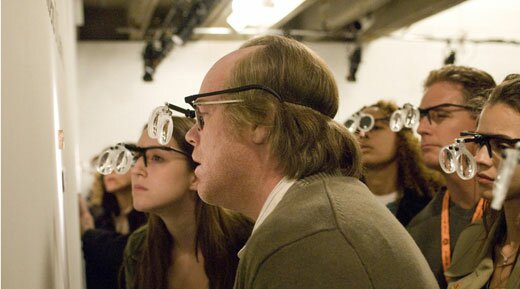Smartypants, New York
Posted by ben on 06 Dec 2008 at 03:25 pm | Tagged as: responses/reviews, video/film

Many of the online discussions and reviews of Synecdoche, New York revolve around the perceived, and self-perceived, intelligence of the viewer. For those who like the movie, the critics who panned it are either too stupid to understand it, or too self-regarding to admit that it affected them. Others attack the admirers for feigning approval only demonstrate their own sophistication. These discussions reveal a lot about the problems with Charlie Kaufman’s latest navel-gazer.
First of all, let’s be clear about this: Synecdoche, New York is not a cinematic game-changer, as some have claimed. It’s fairly original, but is also very much a part of the meta-narrative tradition that stretches from Don Quixote to Inland Empire. “Woody Allen meets David Lynch” encapsulates the movie better than most X meets Y comparisons. Synecdoche doesn’t quite reach the wittiness of Woody Allen’s best work nor the ambitious narrative complexity of late David Lynch; but it’s kind of cool that someone tried to merge the clever, self-absorbed, hypochondriac artist with the non-linear, destabilized, semi-narrative form. What we end up with is a movie that is at turns poignant, funny, cliché and tedious.
Many reviewers agree that after about 45 minutes to an hour, the movie starts drifting and becomes tiresome. People said the same thing about Inland Empire, but Lynch does a better job of maintaining a sense of interpersonal tension, which combines with his consistently powerful cinematography to create enthralling scenes long after the overall narrative has shattered. The result is that as Lynch destabilizes the identities of his characters, they become more intriguing and perhaps more deeply human; as Kaufman does it, they become flatter and more cartoonish. There are some strong scenes late in Synecdoche, New York, but they are harder to come by as the characters are drained of emotional weight.
Charlie Kaufman invested a lot of energy in making this movie clever. Puns and double entendres abound, it’s a surrealism that makes fun of itself, but also takes itself seriously. It’s a fine line that at points Kaufman can’t quite toe, and the characters suffer for it. But the attempt is ambitious enough to make a certain segment of the movie-going public really want to believe that he did pull it off. It’s tempting for these people to assume that Synecdoche’s critics just don’t get it. On the other hand, it’s tempting for those same critics to accuse those who praise it of just being glad to be able to use the word synecdoche in casual conversation, and giggle at the high-minded puns. This cleverness is at once redeeming, as Kaufman is essentially making fun of himself, but also a roadblock to discussion, as people get hung up on the cleverness of the thing and forget to talk about its underlying meaning.
…manhattan’s ghostwriter.
I liked it. Lots of laughs.
A false confession
yes, two bucks
Thanks for nice post.